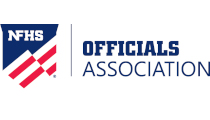
How many times have you sat and watched a game on TV only to be disturbed by the commentators? What about listening to a game broadcast on the radio and being confused by what is being described? Have you had an issue with the newspaper account of a game?
The media is a partner in sports from the high school level to the pros. Most sports journalists are hard working men and women trying to provide an objective report on the contest they are covering.
These same sports journalists also see more sporting events than the average person and have a valuable perspective on high school officiating. While football and basketball contests are the most popular for live media coverage, baseball, softball and soccer also attract live contest coverage. Nearly every sport generates newspaper coverage, though the report may come from the coach or a parent. Podcasts, webcasts and Internet streaming have brought about new coverage options for high school sports.
What do these professionals think about the state of officiating? In an unscientific poll, sports journalists around the state of Indiana were surveyed. They come from radio, newspaper, TV and Web streaming. Some specialize in a single sport and others cover multiple sports each season. A few broadcast games for only one school while other cover a county, a conference or a region. The perspective of these media members is a good place to start the discussion on the perspective of high school officials. They are more objective than fans, coaches and school administrators and bring a breadth of experience.
Participating journalists include; Jeff Brown, sports editor of The Shelbyville News, Rick Conklin, play by play announcer for WIFE radio, Sam Harvey, play by play announcer for WLPK radio, Bryce Kendrick, owner of SEI Local Sports, Aaron Kirkoff, sports director for SEI Publications, Johnny McCrory, news and sports director for WSVX radio and Harold Welter, sports director and 51-year veteran play by play man for WKVI radio. Combined, these sports journalists bring more than 150 years of experience covering multiple high school sports in central and southeast Indiana.
What is your overall impression of the quality of officiating in games in your area?
AK: I would say very good.
RC: I would say the officiating in our area is very inconsistent.
BK: I think the quality is fine relative to the level of the game. I think most who officiate are really doing the best job they can but will make mistakes.
SH: I believe the officiating has improved at the varsity level.
JM: I continue to have a favorable impression of the overall work of officials.
Do you believe the quality is better, worse or the same compared to five years ago?
HW: I would say that it’s neither better or worse, still good quality. Officiating is what it’s always been, very high quality done by mostly dedicated people.
SH: Better at the varsity level but no improvement at the JV level.
RC: I think that compared to five years ago, it is not as good.
AK: I think all get better with age.
JM: I can’t say that I have noticed a dramatic change in quality over that span of time.
Do you see more or less female officials than five years ago?
RC: I see fewer female officials. In fact, it is rare to see one.
HW: I’m seeing fewer female officials and that’s unfortunate because there are now two generations of great female athletes who could give us quality officiating, at both boys and girls games.
JB: Is it a lack of interest by women or a lack of development to support women to get into officiating?
JM: Certainly more. I admit that I still probably notice when I see a female official working a contest, its more common than it has been.
Do you see younger officials coming into sports or are the officials you see the same as you have seen for decades?
BK: My perception is there are fewer new officials, regardless of age.
JB: I would say there are 2 to 3 times per year in my normal coverage area that I see an official that I don’t recognize.
RC: There are some young officials coming into sports. We could use more of them.
SH: There is a mix of veteran officials along with some younger guys. A mix of young and experienced people can be good.
HW: Unfortunately, I’m not seeing a lot of young people officiating. I would like to see the recruiting of young people into the game.
Do you believe officials are generally physically prepared to work their sports?
HW: I believe that most of the officials I see are physically prepared for the game, but with an aging population of officials, many aren’t as capable of getting around as quickly as they once did. That doesn’t mean they’re not physically prepared, just that they aren’t as physically capable as in the past.
JM: I don’t feel like I notice too many examples of officials who miss calls because they were out of position… and I mean out of position that would be caused by being out of shape.
BK: There are some who really should retire. It is painful to watch them try to move or frustrating because they can’t get to where they need to be or should be.
RC: I think most varsity officials are physically prepared. We see many lower level officials who cannot get up and down the floor due to being out of shape.
JB: If you were to ask me my one complaint about officials, it would be about being physically prepared. If it’s too difficult to hustle over to the scorer’s bench, it might be time to retire.
Do you believe adult fans are more or less respectful of officials than a few years ago?
RC: I believe adult fans are mostly respectful, but there are always the obnoxious few. I don’t think the percentages have changed.
AK: I think it goes in cycles. For some reason, a $5 admission ot a contest seems to make some fans feel they can yell and shout about every call. I get to see a close of view of wht is being called on the floor or playing field. Most times, I agree with the officials.
BK: Without question, the answer is less. The lack of respect and tolerance by fans continues to erode to embarrassing lows. I would like to see more fan ejections. When fans start getting removed from games that will start deterring this type of behavior.
JM: Less. I feel the crowds these days can be consistently more difficult to deal with. Overall, I think respect is down for “officials” at all levels.
SH: I do think the majority is respectful.
HW: I don’t think fans are any worse than they were years ago and that may be due to the fact that so many officials have been doing it for so long they know how to control a crowd.
Do you have any general comments on the state of high school officiating?
AK: Officiating is a thankless job. Most times, I agree with the officials. Fans are looking through rose colored glasses, or at least the color of their team.
RC: I would like to see some kind of mentoring system for young officials. I would also like to see a required time of watching video and discussing how certain plays should be called. When officials who do not generally work together get placed together at tourney time, it seems like it takes them a quarter or two to get on the same page.
JB: There is no more thankless job than officiating in the world of sports. I would never say fans cannot express displeasure with an official’s call. But an official should never feel threatened before, during or after any game at any level
SH: Officiating is a hard job to do but the games could not be played without you. I hope more people decide to learn to be an official so the games can continue.
JM: I’ve always enjoyed hearing officials’ appreciation for the games they’ve worked, the people they’ve met and the longtime associations they have gained. While I’m sure officials find an enjoyment in what they do, there’s still a commitment to time, effort and education that they could put into something else. It’s getting more difficult to find someone who wants to stay in it long enough.
HW: While I think that most officials are competent, physically capable and love doing what they’re doing, I see a problem in the not-too-distant future if more young people aren’t’ brought into the fold. I would like to see a public relations campaign to recruit young people into the fold, both male and female. I believe radio would be a great way to get the word out!
BK: I appreciate the effort officials make. I don’t like to talk negatively about the officials because, good or bad, officiating should never be the focal point of a broadcast. Never.
It is apparent that officiating groups need to do a better job of reaching out to local media to educate them about what goes on behind the scenes in officiating. Having these media voices better educated would help to educate the fans and diffuse some of the passion in high school contests. Having a general relationship with the media is good. Discussing calls or plays in a game is not appropriate but laying a foundation of knowledge about rules, mechanics and game management is an appropriate role for officials. Many broadcasters are former officials and should be included in local association activities to keep them updated on the state of the rules and the game.
These comments from people passionate about and knowledgeable of high school sports should help officials remember they work in front of many audiences. Coaches, players, fans, administrators, assigners, observers and the media all look at the work of officials from their unique perspective. Officials shouldn’t tailor their work toward any one audience, they should be true to themselves. However, understanding the various points of few can relieve some stress during games. In fact, officials need to remember that not everyone watching the game is their enemy. In general, broadcasters are fair and friendly to officials because they understand the thankless nature of the job and the biased perspective of the audience.
Dave Sheets
Most Recent Articles
- nfhs news NFHS Learning Center Delivers 25 Millionth Course
- Track & Field/Cross Country article Effective Communication with Athletes and Coaches
- nfhs news Player Equipment Changes Highlight 2025 High School Football Rules Revisions
- Player Equipment Changes Highlight 2025 High School Football Rules Revisions
- nfhs news Judgment Call on Second Contact Eliminated in High School Volleyball






